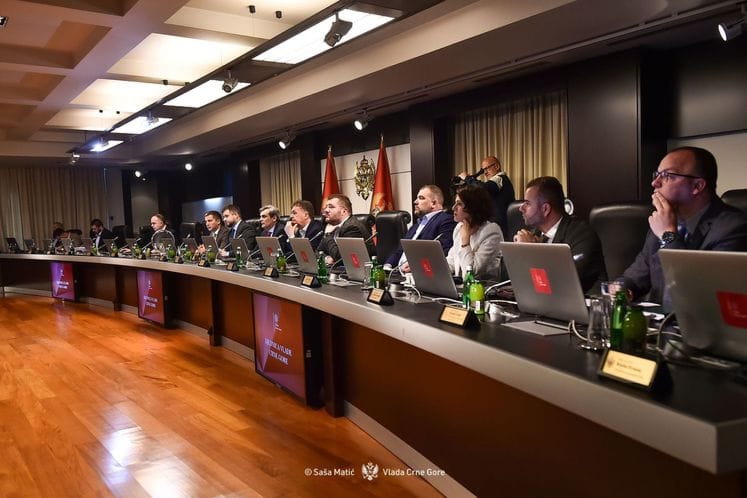- Government of Montenegro
Press release from the 77th Cabinet session
Press release from the 77th Cabinet session

The Montenegrin Cabinet held its 77th session today, chaired by Deputy Prime Minister Aleksa Bečić. The Cabinet adopted the Proposal to amend the Constitution of Montenegro. In line with the Reform Agenda of Montenegro 2024–2027, under the Reform and Growth Facility, which envisages constitutional changes by June 2025, the proposed amendment concerns the provisions of Amendments VIII and IX of the Constitution, regulating the following:
1. The composition of the Judicial Council – Amendment VIII;
2. The role of the Minister of Justice in disciplinary procedures against judges – Amendment IX, paragraph 3.
The proposal aligns with the EU acquis and European standards regarding the independence, accountability, integrity, impartiality, and professionalism of the judiciary and prosecution. It addresses existing recommendations from the European Commission, opinions of the Venice Commission, and the recommendations of the Council of Europe’s Group of States against Corruption (GRECO). The discussion emphasized the need to amend the current constitutional provisions to ensure that the majority of Judicial Council members are judges elected by their peers, that the Minister of Justice is not a Council member, and that non-judicial members are selected based on professional merit and integrity through objective and measurable criteria, to fully contribute to the Council's responsibilities. The Government reiterated that establishing an independent, professional, and reliable judiciary is a strategic priority in Montenegro’s EU integration process. An independent judiciary is the ultimate guarantor of the democratic functioning of institutions at national, European, and international levels, as well as of legal security for citizens.
The Cabinet adopted the Draft Law on amendments to the Law on Tax Advisors. Montenegro joined the Global Forum on Transparency and Exchange of Information for Tax Purposes in 2018, committing to implement international standards for exchange of tax information — both upon request (EOIR) and automatically (AEOI). Accordingly, the new provisions will require tax advisors to provide the Tax Administration with all necessary information for taxation purposes and the exchange of data with relevant authorities of EU Member States or other jurisdictions. Sanctions are also proposed for advisors who fail to comply with these legal obligations.
The Cabinet adopted the Decree on amendments to the Decree on limit values for emission of pollutants into the air from stationary sources. The aim is to consistently apply emission control measures in line with the strategic objectives of the National Strategy for Sustainable Development until 2030 and the Reform Agenda. The amendments address legal uncertainties caused by vague transitional provisions in the previous regulation concerning emission limits and calculations for facilities using multiple fuel types (Official Gazette of Montenegro, No. 129/21).
The Cabinet adopted the Proposal to grant use of state-owned immovable property to the Ministry of Culture and Media free of charge. The Ministry has been granted use of the former prison building in the Old Town of Kotor, free of charge for a five-year period, with the option of renewal. The building, protected as a cultural monument, was reconstructed in July 2021 and now houses a Creative Hub intended for artists and the development of creative industries. The project was funded by the EU Interreg IPA CBC Italy – Albania – Montenegro programme and the Ministry's budget.
The Cabinet adopted the Education Reform Strategy 2025–2035 and the Action Plan for 2025–2026. Initiated by the Ministry of Education, Science and Innovation and UNICEF, and supported by the EU Delegation in Montenegro, the Strategy is part of a two-year project titled Quality Education for Every Child in Montenegro, launched in January 2024. The Strategy envisions a learner-centered education system by 2035, focusing on student well-being, motivation, and individual needs. Schools will employ innovative teaching methods, encourage the development of personal and social skills, and foster inclusive, safe, and supportive learning environments. Teachers and educators will be competent, motivated, and free from excessive administrative burdens, with access to continuous professional development and innovation. The education system will be flexible and based on strong interinstitutional and international cooperation, aligned with EU policies, the Sustainable Development Goals, and the twin green and digital transitions.
The Strategy defines four strategic goals:
1. A quality, accessible, and equitable education system that promotes the holistic development of all children and adolescents and is resilient to challenges and risks;
2. All educational staff equally support quality and equity, develop students' key competencies and lifelong learning skills, and maintain positive attitudes and high expectations for all learners;
3. Improved education quality and equity through better governance and financing, with a focus on evidence-based policymaking and inclusive decision-making processes;
4. Modern, safe, and inclusive educational infrastructure and teaching resources that support high-quality education and care for all children and youth.
The Cabinet adopted the Proposal to withdraw Government Amendments to the Draft Law on amendments to the Law on Civil Servants and State Employees. These amendments, previously adopted at the session of 27 March 2025, have now been replaced with new proposals harmonized with the European Commission. The new amendments provide clearer conditions for appointing heads of administrative bodies and senior managerial staff. Taking into account reforms in the education system, the amendments enable individuals with a Level VI qualification and significant managerial experience to qualify for leadership roles, alongside those with a Level VII1 qualification. By introducing two alternative criteria, the amendments promote inclusivity and flexibility in recognizing managerial potential while maintaining high standards of professional experience. Conditions are also set for expert-managerial positions to ensure structured and qualified leadership in state administration. Positions in this category will be open to all candidates holding at least a Level VI qualification or higher, thereby improving merit-based recruitment and reducing the risk of appointing unsuitable candidates to key roles.

